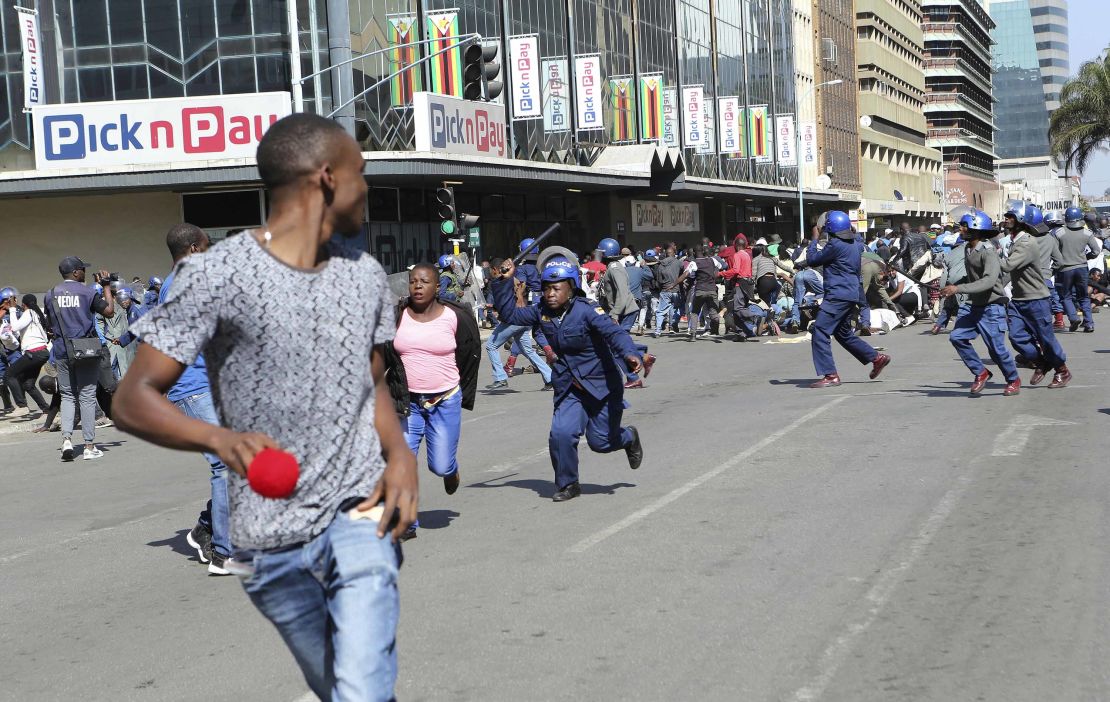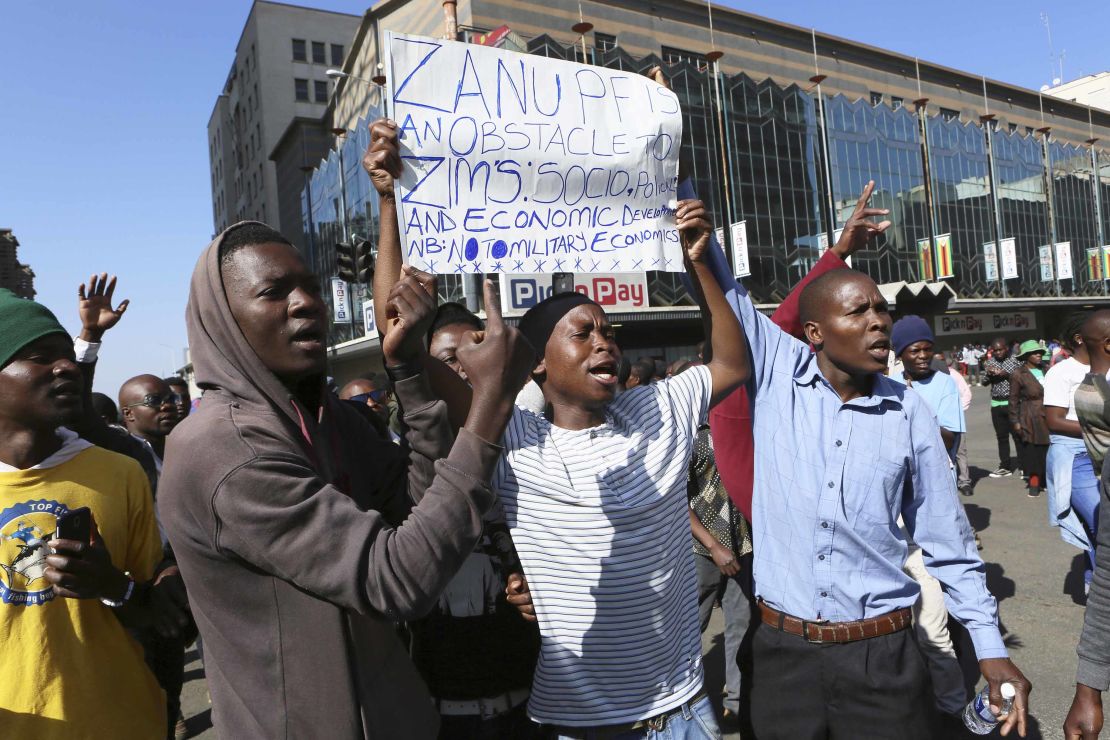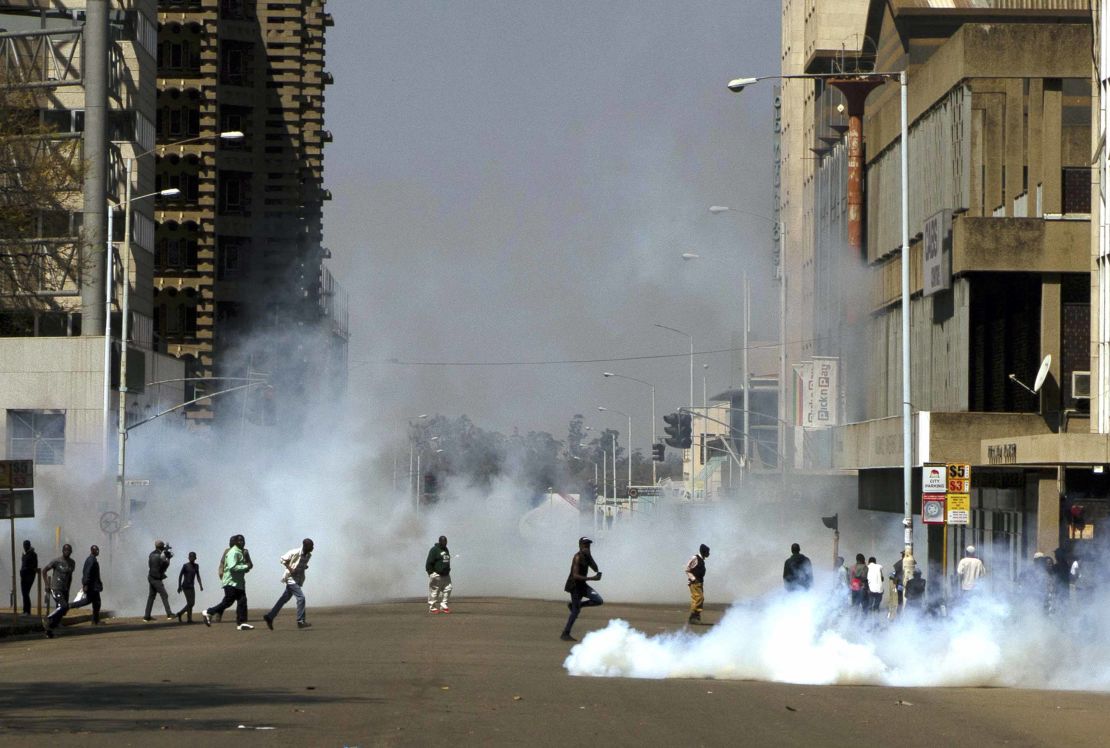Tensions between Zimbabwe’s main opposition party and President Emmerson Mnangagwa’s government escalated into violence in the country’s capital on Friday after a court ruled against a planned opposition protest.
Police clashed with opposition party members who had gathered at the Africa Unity Square in Harare’s central business district in defiance of the ban on Friday morning, firing tear gas and charging others with batons. A crowd of opposition members were rounded up and arrested.
The country’s main opposition party, the Movement for Democratic Change (MDC), had called for a nationwide demonstration against Mnangagwa’s government, which it blames for the country’s crippling economic crisis.
Mnangagwa’s administration has struggled to stabilize a moribund economy and curb hyperinflation while a severe drought has crippled productivity.
Demonstrator Spiwe Moyo, 47, told CNN police used batons to beat her at the square. “I’m in pain. I don’t even know why I was beaten. I would continue to fight, especially for us women. I can’t get anywhere. I don’t have money for my children’s school fees and I don’t know how I am going to survive,” Moyo said.

Zimbabwe police spokesman Paul Nyathi told CNN they were investigating allegations that protesters were beaten and said that some demonstrators had also assaulted the police.
“We have found out that there were youths making confrontational moves towards the police. This led to a stampede where one woman was badly injured. She was whisked away for medical attention,” Nyathi said.
As early as 6 a.m. on Friday morning,, anti-riot police officers had cordoned off the court where the ruling was to take place, as police patrolled the streets and searched those nearby. Commuters were also subjected to security checks at roadblocks.
MDC spokesman Daniel Molokele insisted that the protest had not been postponed: “We did not call this protest off, the police blocked our supporters from being able to come to town.” He added that continued protests are planned as a “roadmap” to change the situation in Zimbabwe.
Molokele denied that the opposition was in direct talks with Mnangagwa and said that the MDC wants an independent mediator to chart a way forward.

Abduction and assault
Violence against opposition leaders and members of civil society members had marred the days leading up to the protests, which were planned in several cities and towns across the country.
The United States Embassy in Harare condemned the violence on Thursday, saying that it “expresses its deep concern over the abduction, assault, and torture of civil society and opposition leaders in advance of the planned march.” It added that the Zimbabwe government “bears the responsibility to ensure the safety of its citizens under its constitution.”
In a press release, the heads of several civil society organizations said six people were abducted and severely tortured on Tuesday and Wednesday. The release states that during the abductions, the attackers accused the victims of organizing Friday’s planned demonstrations.
Nyathi said police were looking into the abductions. “We have said it from the onset that we are investigating the case of the six who were reportedly abucted. But we want to make it clear that people should not take advantage and spread falsehoods. No case will be swept under the carpet.”
On Thursday, Mnangagwa called for dialogue and appealed to opposition leaders for a peaceful resolution.
“I reiterate my calls to all opposition leaders that my door remains open and my arms remain outstretched. Riots & destructive violence must be rejected; peaceful constructive dialogue are the way forward,” Mnangagwa said on Twitter.

An escalating crisis
The southern African nation is in the middle of a crippling economic and hunger crisis. Some 2 million people are facing starvation after a severe drought and cyclone that devastated the eastern region of the country affected food harvests, the World Food Programme (WFP) said in an August report.
And in June, the UN estimated that more than 5 million people – a third of the country’s population – will need food and humanitarian assistance by next year.
WFP country director Eddie Rowe told CNN earlier this month that the economic challenges the country is facing had worsened the food crisis.
“The food security situation in the country has been compounded by the economic situation. This year we have more hungry Zimbabweans than ever before,” Rowe said.
In a letter to church leaders this week, Mnangagwa blamed the country’s economic situation on the natural disasters and decades of Western sanctions which has isolated the country for many decades.
“We must continue in the path of reforms in spite of temporary hardship for a better tomorrow,” Mnangagwa said, adding that his administration was also engaging the international community for support.
Journalist Mark Chingono reported from Harare while CNN’s Bukola Adebayo wrote from Lagos. CNN’s Kara Fox contributed to this report.

